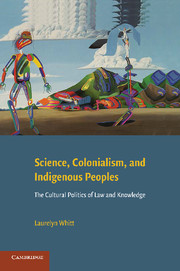Book contents
- Frontmatter
- Contents
- Preface
- Acknowledgments
- First Words
- PART I BIOCOLONIALISM AS IMPERIAL SCIENCE
- 1 Imperialism Then and Now
- 2 Indigenous Knowledge, Power, and Responsibility
- 3 Value-Neutrality and Value-Bifurcation: The Cultural Politics of Science
- PART II THE HUMAN GENOME DIVERSITY PROJECT: A CASE STUDY
- PART III LEGITIMATION: THE RULE AND ROLE OF LAW
- Conclusion – The Politics of Knowledge: Resistance and Recovery
- Bibliography
- Index
- References
2 - Indigenous Knowledge, Power, and Responsibility
Published online by Cambridge University Press: 04 August 2010
- Frontmatter
- Contents
- Preface
- Acknowledgments
- First Words
- PART I BIOCOLONIALISM AS IMPERIAL SCIENCE
- 1 Imperialism Then and Now
- 2 Indigenous Knowledge, Power, and Responsibility
- 3 Value-Neutrality and Value-Bifurcation: The Cultural Politics of Science
- PART II THE HUMAN GENOME DIVERSITY PROJECT: A CASE STUDY
- PART III LEGITIMATION: THE RULE AND ROLE OF LAW
- Conclusion – The Politics of Knowledge: Resistance and Recovery
- Bibliography
- Index
- References
Summary
An excellent antidote to the power of our Western hierarchical oppositions and the theory of knowledge upon which they ride is an acquaintance with other theories of knowledge and ontologies.
– Joanna OveringIntroduction
Keeping in mind the caveats voiced above about the need to acknowledge differences within, and similarities across, indigenous and western knowledge systems, the burden of this chapter is to acknowledge some of the differences between them. One of the most consequential of these is the fact that knowledge tends to be tied to the natural world in very different ways within indigenous and western knowledge systems. Among indigenous peoples, for example, the belief that knowledge and land are intimately bound to one another is widely shared, as is the accompanying belief that the natural world is alive, spiritually replete. Not only are these beliefs generally not shared by the dominant knowledge system, but they are at odds with varying aspects of it. Without some appreciation of such differences, we cannot fully grasp the force of indigenist critiques of biocolonialism, nor can we understand well how contemporary relations of power sustain cultural imperialism. The policies which legitimate biocolonialism, and the practices which constitute it, arise within a cultural milieu notable for its marginalization and dismissal of indigenous knowledge systems.
This chapter and the next situate the struggle over biocolonialism within the context of indigenous and western knowledge systems, and the dynamics of power which structure their interaction.
- Type
- Chapter
- Information
- Science, Colonialism, and Indigenous PeoplesThe Cultural Politics of Law and Knowledge, pp. 29 - 56Publisher: Cambridge University PressPrint publication year: 2009



